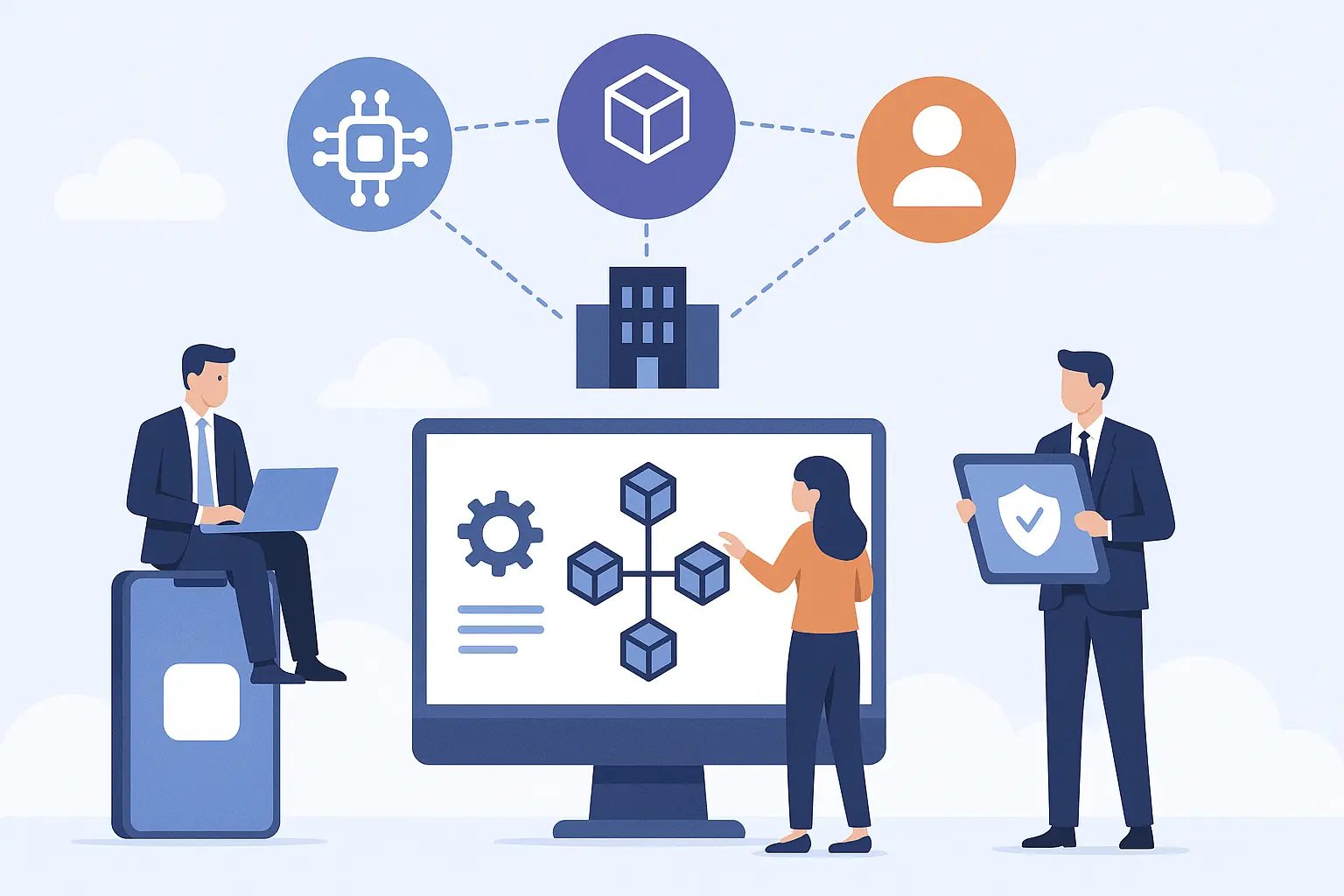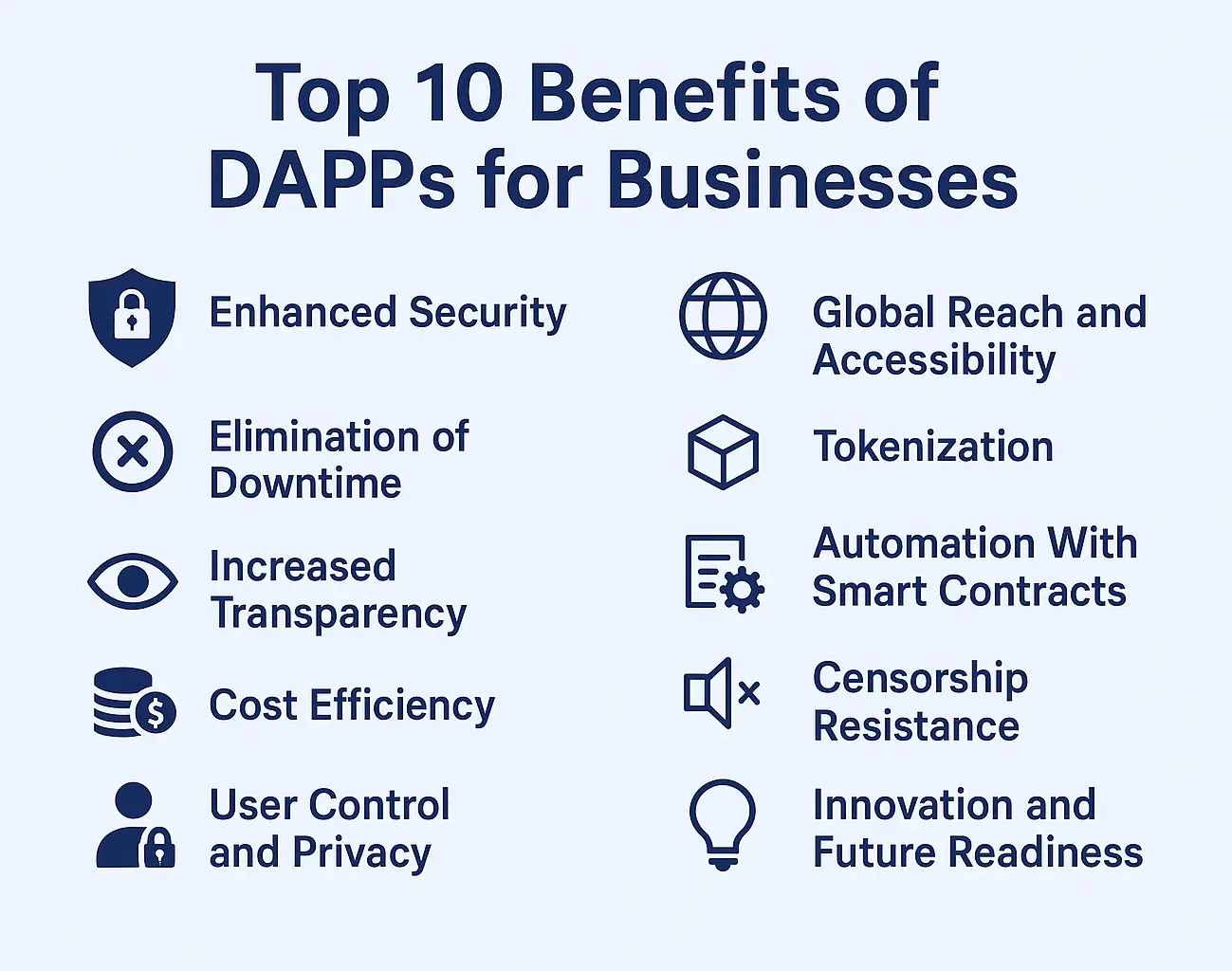Table of Contents
In today’s rapidly evolving digital economy, businesses are constantly seeking innovative solutions to increase operational efficiency, improve transparency, and deliver better value to their customers. Among the technologies spearheading this transformation, decentralized applications (dApps) are emerging as a game-changer.
Unlike traditional apps, dApps run on a decentralized blockchain network, ensuring that no single authority controls the application. This foundational shift is unlocking a range of powerful benefits for businesses across industries—from finance and supply chain to healthcare and entertainment.
While blockchain technology was initially associated mainly with cryptocurrencies, its utility in creating secure, transparent, and resilient applications is now becoming more broadly recognized. For companies aiming to stay ahead of the curve, integrating dApps into their operations can provide a significant strategic advantage.
Below, we explore the top 10 benefits of decentralized apps for businesses, helping you understand why dApps are more than just a tech trend—they’re the future of digital enterprise.
Top 10 Benefits of Decentralized Apps for Businesses
Decentralized apps are beneficial for the startups as well as enterprises in many ways. Let us go throught the top benefits of decentralized apps for businesses.
Enhanced Security and Data Integrity
One of the standout benefits of dApps is the high level of security they offer. Because dApps operate on a blockchain, every transaction is encrypted, time-stamped, and immutable, making it nearly impossible for hackers to tamper with records.
Traditional apps rely on centralized servers, which are vulnerable to breaches. In contrast, decentralized apps distribute data across nodes, making the system significantly more resistant to attacks and data manipulation.
For businesses that handle sensitive information such as financial records, intellectual property, or customer data, this level of protection is crucial.
Elimination of Downtime
Since dApps run on peer-to-peer networks, there’s no single point of failure. Even if multiple nodes go offline, the application continues to function through other nodes. This leads to unparalleled uptime, especially compared to centralized systems that can crash due to server failure or maintenance.
This reliability is especially important for financial services, e-commerce platforms, and critical business operations, where even a few minutes of downtime can result in major revenue loss.
Increased Transparency
Blockchain technology makes every transaction and change in a dApp traceable and verifiable. For businesses, this level of transparency builds trust with customers, partners, and stakeholders.
Whether it’s tracking the origin of a product in the supply chain or maintaining verifiable audit trails, the data stored in decentralized apps can be accessed in real-time without relying on third-party intermediaries.
Industries like food, pharmaceuticals, and logistics can greatly benefit from this traceability, reducing fraud and increasing accountability.
Cost Efficiency
By eliminating intermediaries, automating processes with smart contracts, and reducing the reliance on third-party infrastructure, businesses can cut down on operational costs. dApps can also streamline compliance, reporting, and payment processes, saving both time and money.
For startups and SMEs, these cost savings can make the difference between success and stagnation in a competitive market.
User Control and Privacy
With dApps, users maintain full control of their data and digital identity. Instead of entrusting a company with private information stored on central servers, users interact with smart contracts that process their data without compromising security or ownership.
For businesses, offering such privacy and autonomy to users can be a key differentiator, especially in an age where data protection regulations like GDPR are becoming increasingly stringent.
Global Reach and Accessibility
Because dApps are built on open-source, borderless blockchain networks, they can be accessed by anyone with an internet connection, anywhere in the world. This opens up new opportunities for businesses to serve global audiences, including users who may be excluded from traditional financial or digital services.
From decentralized finance (DeFi) platforms to global marketplaces, dApps empower businesses to scale operations beyond geographical and regulatory boundaries.
Tokenization and New Revenue Models
Many dApps support token economies, where businesses can issue utility or governance tokens to reward users, raise capital, or drive participation. These token-based incentives can lead to new revenue streams, customer loyalty programs, or even community-led governance structures.
Tokenization also allows for the fractional ownership of assets, enabling new business models in sectors like real estate, art, gaming, and investment.
Automation Through Smart Contracts
At the core of most dApps is the smart contract, self-executing code that automates business logic without human intervention. This allows businesses to automate tasks such as payments, agreements, supply chain workflows, and user authentication.
By reducing manual oversight and minimizing human error, smart contracts ensure faster execution and increased accuracy in business operations.
Censorship Resistance
Since decentralized apps are not hosted on centralized servers, they are much harder to shut down, block, or censor. This is particularly beneficial for businesses operating in regions with strict regulations or limited digital freedoms.
For content creators, news platforms, or fintech startups, building on decentralized architecture ensures that their services remain accessible and resilient, regardless of external political or corporate pressures.
Innovation and Future Readiness
Finally, embracing dApps positions a business at the forefront of technological innovation. As the world moves toward Web3, decentralized finance, NFTs, and metaverse integrations, businesses that adopt dApps today will be better prepared for the digital infrastructure of tomorrow.
Developers and entrepreneurs working with dApps can create entirely new ecosystems, redefine customer experiences, and participate in the next generation of internet-native economies.
Final Thoughts
Decentralized applications offer a powerful alternative to traditional centralized systems, combining the security of blockchain with the flexibility of open-source development. For businesses, the benefits are compelling: enhanced security, lower costs, transparency, automation, and global reach, to name a few.
However, adopting dApps also requires a solid understanding of blockchain protocols, smart contract development, and user experience optimization. That’s where expert blockchain development companies like Technoloader come in.
At Technoloader, they provide end-to-end dApp development solutions, including architecture design, smart contract coding, testing, and deployment. Whether you are looking to launch a DeFi platform, NFT marketplace, or enterprise-grade dApp, their team can turn your vision into a scalable, secure, and future-proof product.
Ready to bring decentralization to your business? Contact Technoloader today and explore how dApps can transform your digital strategy.
 +91 7014607737
+91 7014607737
 info@technoloader.com
info@technoloader.com




